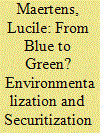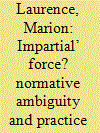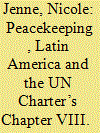|
|
|
Sort Order |
|
|
|
Items / Page
|
|
|
|
|
|
|
| Srl | Item |
| 1 |
ID:
165114


|
|
|
|
|
| Summary/Abstract |
The cholera outbreak brought to Haiti in 2010 as a consequence of wastewater mismanagement in one of the UN Stabilisation Mission’s camps drew attention to the concrete material footprint of UN peace operations. Since the 2000s, UN peacekeeping missions have been increasingly confronted with environmental challenges. Multiple transformations in terms of norms and practices resulted from these environmental concerns. Drawing on data generated through interviews and participant observation, this article explores how environmental concerns are integrated in UN peacekeeping operations and develops a two-fold argument. First, I argue that the inclusion of environmental concerns in UN peacekeeping relies on the environmentalization of peacekeeping practices. It consists of heterogeneous elements – standards, expertise, training, mainstreaming, equipment management – which focus on the ecological footprint of UN peacekeeping. Second, I show that environmentalizing peacekeeping contributes to the securitization of the environment. By understanding the dynamics of inclusion of environmental concerns, this article sheds light on one of the ways through which emerging issues broaden and widen UN peacekeeping practices.
|
|
|
|
|
|
|
|
|
|
|
|
|
|
|
|
| 2 |
ID:
165112


|
|
|
|
|
| Summary/Abstract |
Impartiality is a core legitimating norm for United Nations peace operations. Yet beliefs about what that norm requires of UN personnel have shifted dramatically. In 2013, for example, the Security Council created an intervention brigade – composed of infantry battalions, special forces, and an artillery company – to ‘neutralize’ non-state armed groups in the Democratic Republic of the Congo (DRC). According to critics, these activities violate core peacekeeping norms, including impartiality. This criticism elicits a puzzling response from many UN officials. They downplay the novelty of new practices, insisting that they are still ‘impartial’. Where does this discursive pattern come from, and what does it tell us about the relationship between day-to-day practices and the norms that ostensibly guide UN peace operations? Drawing on evidence from the DRC, I argue that norms like impartiality may endure – and remain rhetorically powerful – without telling us much about how practices on the ground have evolved. Instead, insisting that new practices are impartial can be a way for UN personnel to stabilize a core part of their identity under conditions of normative ambiguity. It can also be a way of glossing over contestation and pre-empting concerns about partiality in UN peace operations.
|
|
|
|
|
|
|
|
|
|
|
|
|
|
|
|
| 3 |
ID:
165116


|
|
|
|
|
| Summary/Abstract |
The literature on peacebuilding has increasingly emphasized the importance of the local level – a trend that has been called the local turn. For some researchers, the local turn can improve international peacebuilding interventions, while for others it is an agenda to promote an emancipatory and legitimate peace. There is however mixed evidence backing the argument that addressing local level issues in peacebuilding can make a substantial difference. The local turn reposes on assumptions that appear particularly problematic in an environment characterized by the lack of an elite-level pact, such as a conflict terminated in a military victory. Looking at the crisis in Côte d'Ivoire, which terminated in 2011 with the defeat of former president Laurent Gbagbo, this article highlights how the lack of elite level reconciliation compromises the effectiveness of actions aiming to promote local ‘social cohesion’. It also shows how the discourse and practices of the local turn can be appropriated by semi-authoritarian post-conflict governments in order to depoliticize the peacebuilding process. It concludes that the popularity of the ‘local turn’ among peacebuilders might be due more to the opportunity that it offers to eschew delicate national-level political issues, than to its supposed emancipatory potential.
|
|
|
|
|
|
|
|
|
|
|
|
|
|
|
|
| 4 |
ID:
165111


|
|
|
|
|
| Summary/Abstract |
In spite of being a multi-billion-dollar undertaking fundamentally reshaping the lives of people around the world, UN peacekeeping has only recently started to attract scholarly attention among a broader audience. While the evolution of norms and practices in other international organizations, such as the World Bank, the IMF, or the UNHCR, has been extensively analyzed, the transformation of peacekeeping operations has been no less significant.
|
|
|
|
|
|
|
|
|
|
|
|
|
|
|
|
| 5 |
ID:
165115


|
|
|
|
|
| Summary/Abstract |
Authorities at the United Nations have repeatedly called on regional organizations to step up their commitment in the area of peacekeeping. These calls are based on Chapter VIII of the UN Charter, which gives regional organizations a role in international peace and security. While organizations in Europe and Africa have created regional peacekeeping arrangements, such have failed to emerge in Latin America. This is puzzling, for different reasons. On the one hand, several countries have recently sought to increase their peacekeeping profile. States have strong incentives to pool their resources, especially if they face budgetary constraints such as the developing countries of Latin America. On the other hand, peacekeeping might provide an answer to some of the security problems the region faces. This article provides an evaluation of how Latin America has responded to the global demand to develop regional peacekeeping capacities. I argue that cooperation in peacekeeping has mainly been the result of foreign policy considerations rather than a concern for peacekeeping per se. In light of past experiences of shallow institutionalization, the article concludes with a reflection on the future prospects for a Latin American peacekeeping framework.
|
|
|
|
|
|
|
|
|
|
|
|
|
|
|
|
| 6 |
ID:
165113


|
|
|
|
|
| Summary/Abstract |
This article traces the origins, development and implications of Human Rights Up Front (HRuF), a bold and visionary initiative launched by former Secretary-General Ban Ki-Moon in 2013. While HRuF is part of a broader continuum of human rights-related reforms, its scope and focus is distinctive. HRuF puts the imperative to protect people from serious violations of human rights and international humanitarian law at the core of the UN’s strategy and operational activities, and obliges staff to speak out about abuses and looming crises. Using the case study of South Sudan and drawing on over 150 interviews conducted in-country, this article considers the implications of HRuF for peacekeeping and, specifically, for impartiality, a norm traditionally regarded as the ‘lifeblood’ and ‘heart and soul’ of the UN Secretariat. I identify three challenges that have hindered the UN’s ability to deliver impartially on its protection and human rights mandate and the consequences thereof for the UN’s perceived legitimacy in South Sudan. Further, I examine how the Organization has tried, with mixed success to manage the dilemmas and tensions that have arisen from the privileging of individual, as opposed to state or government, security, and the implications for the broader functioning of the UN.
|
|
|
|
|
|
|
|
|
|
|
|
|
|
|
|
|
|
|
|
|